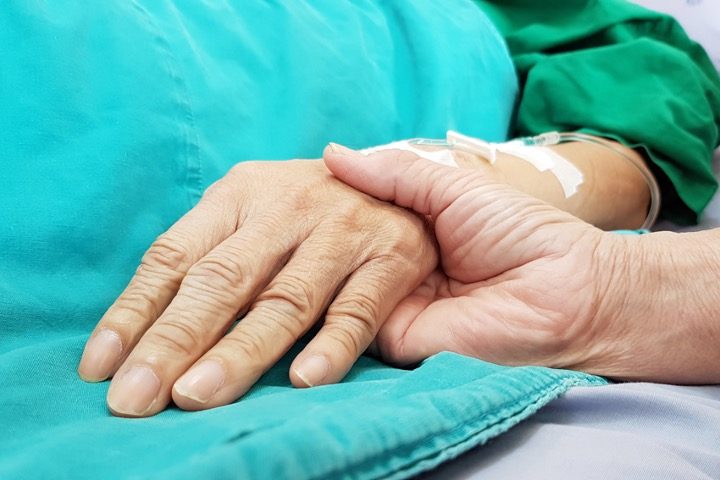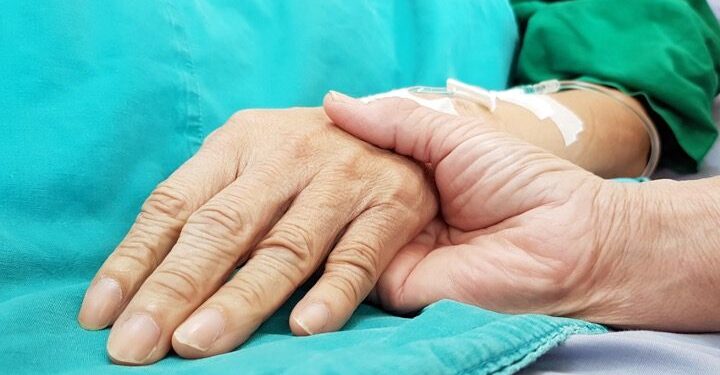
A Canadian man chose assisted suicide after developing a gigantic bedsore during a four-day emergency-room stay, putting advocates of both socialized medicine and legalized euthanasia on the defensive.
According to the CBC, Normand Meunier, 66, went to the emergency room at a hospital in Saint-Jérôme, Quebec, in January while suffering his third respiratory virus in three months.
Meunier became a quadriplegic after incurring a spinal-cord injury in 2022. Since he is incapable of rolling over in bed, he needs a special, alternating-pressure mattress to prevent him from developing bedsores — or someone must manually shift his position on a regular basis.
“When you’re lying down, always in the same position, there’s hyper-pressure between the bone and the skin,” Jean-Pierre Beauchemin, a retired geriatrician and medical professor at Université Laval, told the CBC. “A pressure sore can open in less than 24 hours, and then take a very long time to close.”
In other words, even if Meunier had only spent a few hours in the emergency room, he would have required either manual turning or a special mattress. As it happens, he was kept on a stretcher without being turned for four days.
“Ninety-five hours on a stretcher, unacceptable,” Meunier’s partner, Sylvie Brosseau, told Radio-Canada.
“Every time we go to the hospital, it’s my duty to tell them that Normand is quadriplegic and needs an alternating pressure mattress…. I don’t understand how this can happen because a mattress is the most basic thing.”
The local health authority, CISSS des Laurentides, “confirmed it has 450 therapeutic mattresses, including 145 with alternating pressure, in its facilities,” wrote the CBC.
Unfortunately, those mattresses don’t work on stretchers, CISSS des Laurentides director of nursing Steve Desjardins told the CBC.
“An emergency room is a riskier place for a fragile person,” he said. “That’s why, if necessary, we’re going to work actively to give them access to a bed in an inpatient unit.”
Apparently, the Saint-Jérôme hospital’s definition of “work actively” is “do nothing.” Keeping any patient on a stretcher in the emergency room for four days is an outrage; keeping a quadriplegic who needs regular attention and special accommodations there is unforgivable.
Thanks to his extended stretcher stay, Meunier developed a bedsore that the CBC described as “a gaping hole a few centimeters in diameter” that “would, at best, take several months to heal.” After undergoing two debridements, procedures that scrape away dead or infected tissue, in a month, Meunier decided that enough was enough.
“I don’t want to be a burden,” he told Radio-Canada March 28. “At any rate, the medical opinions say I won’t be a burden for long; as the old folks say, it’s better to kick the can.”
The next day, with government-sanctioned medical assistance, Meunier breathed his last.
University of Toronto law professor Trudo Lemmens told the CBC Meunier’s case is “an illustration of problems in our health-care system.”
Vulnerable people are, as Meunier put it, made to feel like a burden. “Then,” said Lemmens, “the system responds by saying: ’well, you have access to medical assistance [in] dying.’”
“Medical assistance in dying is more easily available and on a more regular basis than some of the most basic care,” he claimed.
When Canada first legalized Medical Assistance in Dying (MAiD), it was strictly for those with terminal illnesses. However, as invariably occurs, MAiD was expanded in 2021 to include those whose deaths are not “reasonably foreseeable.”
As Krista Carr, executive vice president of disability-rights group Inclusion Canada, explained to True North, original-recipe MAiD was for people trying to “escape a painful death,” while the post-2021 version is for those trying to “escape a painful life.”
“It’s just a terrible testament to where things have gotten to in our society that we would think death provided by the state would be an acceptable solution to alleviating the ‘suffering’ of people with disabilities,” Carr said.
Sadly, no one speaking to the media seems interested in searching for the root cause of the problem. Some want investigations; others want more funding for hospitals or disabled people. All are denying the obvious.
On the one hand, there are the euthanasia enthusiasts who want to deflect blame for Meunier’s fate. “This is not/should not be/ought not to be hijacked to be a conversation about MAiD,” assisted-suicide advocate Dr. Stefanie Green said in an email to True North. “That terrible mistake should not reflect on … the country’s MAiD program.” Never mind that in the absence of MAiD, Meunier would probably still be alive.
On the other hand, there are those who think more socialism is the solution. They can see that Canada’s already-socialized healthcare system has an incentive to do nothing for patients and then herd them into MAiD — Carr noted that “somebody somewhere with a pencil knows how much less that’s going to cost” — but then complain that the system is “underfunded,” as if pouring more tax dollars into it will change hospitals’ incentives. (Carr griped that the social services she thinks would solve the problem are also chronically short of cash.) Some, such as a group of Canadian Marxists, actually have the nerve to blame Meunier’s death on “capitalism”!
The solution to socialism is not more socialism but less — preferably none. The solution to hospitals’ using MAiD to keep their costs down is not to give them more money, but to repeal MAiD. Anything else is just rearranging the proverbial deck chairs.
































 Reaction & Commentary
Reaction & Commentary
















